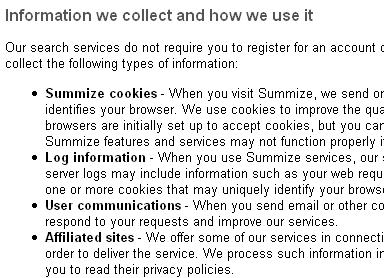The Open Data Workshop 2007
took place yesterday in New York City. The gathering was organized by AttentionTrust and sponsored by Reuters. The workshop brought together over sixty influencers from
startups, web giants, financial firms, venture capitalists and journalists interested in
the attention space. It was a very refreshing, open and candid dialog about the different
issues and faces of open data.

Open Data in the context of the workshop referred to three different things:
- A public API for a service;
- Release of anonymous consumer information for research;
- The user’s explicit and implicit attention information.
Opt-in or Opt-out
Probably the hottest topic revolved around
tracking users behavior. Websites (and even ISPs!) these days
routinely track peoples behavior without, letting them know in an obvious way. Often
there are disclaimers and fine print, but people are not warned upfront in plain English
about the fact that their data is being captured. Is this reasonable?

The group voiced various opinions supporting both sides of this argument, splitting
nearly 50-50. Some people thought that consumers have to be informed in big bold letters
about what is going on. Others argued that businesses need targeted advertising to make
money, so it is fair game.
People with opt-in experience explained that it is rather tough to make money this
way, since only 10% of users sign up. So collecting data by default, with a somewhat
obscure opt-out, is basically the only sure way to monetize attention today. Personally,
I voted for the opt-in camp, since I think that consumers get angry when they find out
their data is being collected without sufficient warning.
Here is an example of something that I find reasonable. Abdur Chowdhury’s new venture,
called Summize, has very clearly stated a simple and
understandable privacy
policy:

APIs
Dick Costolo, CEO of Feedburner, said that having an API is a competitive advantage.
He explained that by having APIs, Feedburner encourages people to build other services on
top of Feedburner – instead of building a fully competitive offering. As a result user
information flows through Feedburner, making it an information hub. Amazon is similar –
its eCommerce API was one of the first APIs on the market. Their leverage is that all
product URLs point back to Amazon, so the traffic comes back to them.
Beyond competitive advantages and centralizing information, another value is
creativity. APIs encourage people to come up with innovative ways to use information.
This benefits everyone. For example, Upendra Shardanand, CEO of the DayLife news service, demonstrated several interesting
and creative ways of using their API. Among them was a visualization that depicted news
as a constellation of stars, which offered insightful navigation and allowed the user to
drill in to get more details.
Minding Open Data
Most people agreed that having APIs is beneficial and that opening up information can
lead to good things. The workshop participants also recognized that there may be bad,
unintended consequences. Abdur Chowdhury, who was AOL’s Chief Architect for Search &
Navigation during the private data
leak, warned businesses to ask three questions before opening up consumer
information:
Think about why you are opening the data?
Hopefully you will be able to improve users experience and give them something in
return.
What are you going to do once you open the data?
How are you as a company going to manage the release? Will you be able to keep up with
the volume of requests and interest in the data? How will you handle the public shock
that the data is being collected in the first place?
Are you ready for the unexpected consequences?
Obviously AOL were not, but will you be?
Conclusion
Despite the fact that participants were not in agreement on several points, the day
felt very productive, remarkably open and candid. Ideas were exchanged without agendas,
partly because the topics were very interesting and partly because the moderators – Gerry
Campbell from Reuters and Seth Goldstein from Attention Trust – kept everybody on track.
The day ended with a bullet list summary of the discussion:
- You think people know that data is being collected, but they do not. Even
sophisticated users do not. How do we increase consumer awareness of these issues? - It is important to understand what information is being collected/shared and for what
purpouse. How do we segment the information into private and less private? - Attention information has worth. How do we go about monetizing attention?
Please join the debate here and let us know what you think about these
thought-provoking issues.










